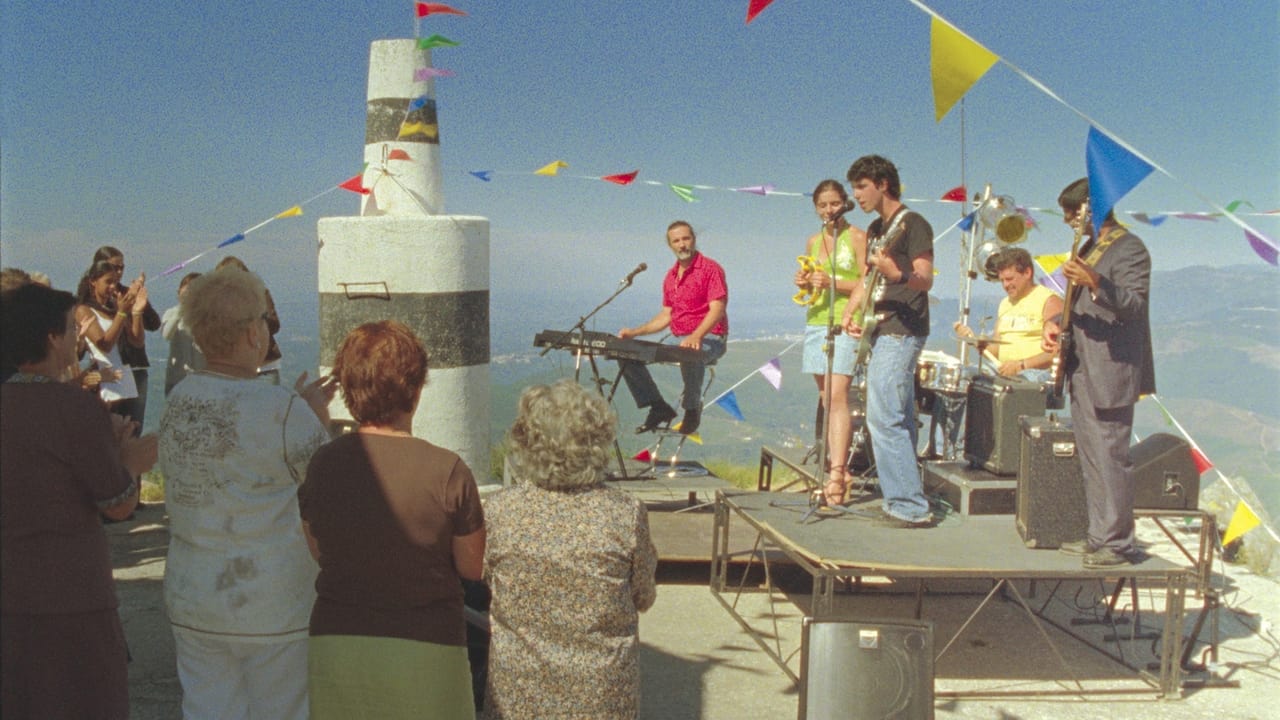

In the heat of August everything happens in rural mountainous Portugal: village parties and popular dances, processions, trains and pilgrimages,karaoke sessions, flirtations and love-making, bathing in the fluvial beach, the brass bands, the rock bands shows, the challenge singings with their waggeries, the boar hunt, the jumping into the river, the forest fires and the firemen and the coming of emigrants on holidays to their birthplace to enjoy and witness all this. And all this is shown on this movie in a cocktail of meaningful images and scenes and a pot-pourri of estival love songs, adopting an indiscreet camera style, here peering into real scenes and events and there picking up natural and spontaneous conversations, dialogues and speeches. In parallel with this documentary feature the movie has also a plot that is intentionally kept somewhat in the shade and that involves a father, a daughter and a nephew who form a ball music band. Their sentimental relations with each other degenerate sometimes into conflicts. In the end of the movie we watch a curious technical discussion by the team who made it. It's a cute movie (this is the adjective that better suits it) but a good one anyway.
... View MoreI am aware that lately some movie directors use documentary and fiction in their films. Actually, almost everybody (critics and public) mentions that in what concerns this film, but for me that is the smallest part of what is important in "Aquele querido mês de Agosto". Its splendor and beauty results, in my opinion, in the adequate way how the plot's initial idea, such as the emotional connections among father, daughter and a cousin, elements of a popular band of musicians, are worked and manipulated making them extremely appropriated to the lyrics and sounds of songs of Portuguese popular music, which illustrate, interpret and emphasize their "soul" moods. And that occurs with no prejudices - this kind of music is generally associated with popular balls, to a "superficial" music made to dance, not to think about its contents. However a blogger wrote that this film is to watch and to "read".A critic also said that Miguel Gomes is not "deaf" to the images neither "blind" to the sounds and I agree with them.Besides a high sense of humor, not very common in the Portuguese cinematography, is another of the strengths of "Aquele querido mês de Agosto". The glare of this movie remains after we leave the cinema and we dream to live again another wonderful month of August.
... View MoreJust forget all about globalization. Portugal and Portuguese movies are unique: you can see it in "Aquele querido mês de Agosto" (That dearest August month). In August those who live in big towns and the emigrants come back to their little villages, some foreigners appear as well and all this people join together with the (polyglote) locals. Little familiar bands play and sing for others to dance in the summer festivals and this popular songs become lovely when sang by the wonderful leading role actress. This film includes it's "making of" and plays with the idea of "how a Portuguese movie is made". It is funny, it is poignant, it is innocent and it is intelligent just like anyone. In this movie you can find all except bad taste. And Portuguese people can feel proud of being Portuguese!
... View MoreThis brilliant film is genially directed by Miguel Gomes (one of the brightest and youngest Portuguese filmmakers) and approaches a large number of issues, inside the Portuguese culture as well as in cinema representation of reality.The frontier between documentary and fiction is explicitly broken, since the reality which is represented on screen is many times the reality that is found everyday, but being represented on screen, becomes a different reality, obviously. It may seem a bit confusing, but the film-making makes it perfectly clear presenting the characters (and film crew) in their own environment, creating genius dialog lines, guarantying the continuity in narrative with delicious details, crossing the characters' path everything fits completely.With the best Portuguese humor, there are some questions which are pointed during this master-piece, as the religious belief, the secret dark customs of the relation between members of the same family (between brothers, father-daughter, cousins, etc.), the lack of strictness of the Portuguese people (as far as serious work is concerned), infidelity, the negative idea that the Portuguese people have of themselves or the isolation of the small villages in terms of absorbing new ways of thinking.This is a film with a large number of dimensions or layers, like an onion. It is the reality of the deep Portugal in 147 minutes, guided by Portuguese popular music, which is the best sound track – through its lyrics and melodies – of what is presented to the viewer.It is, after that, a great example of a film within a film in a extraordinary exercise of pointing out the problems of cinema in Portugal, invoking the particular characteristics of cinema in comparison with other art forms.Portugal needed this film to think about itself.
... View More